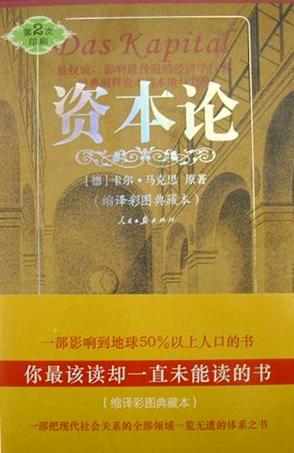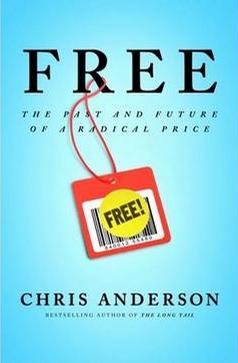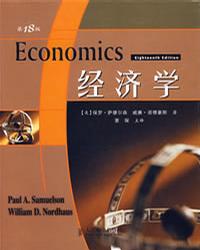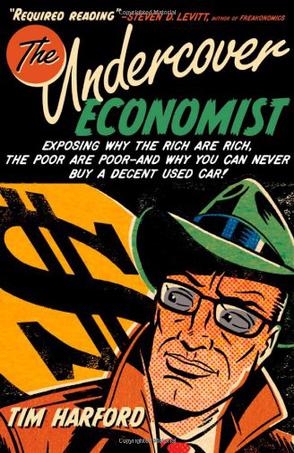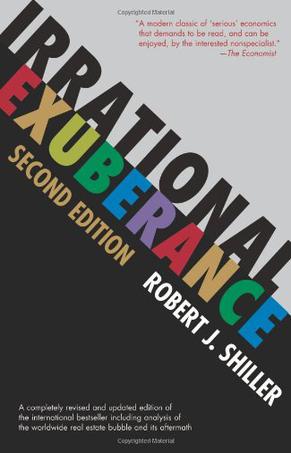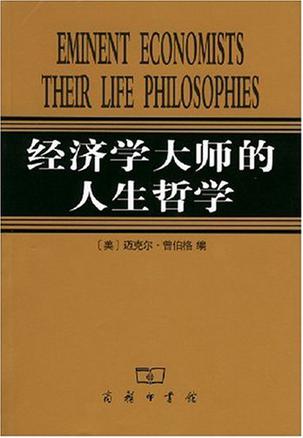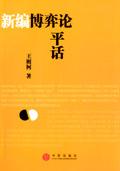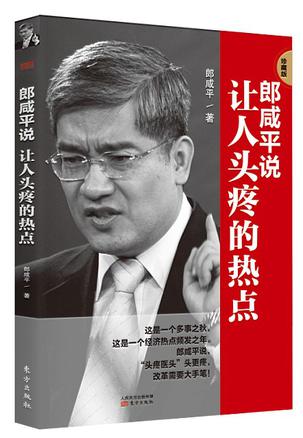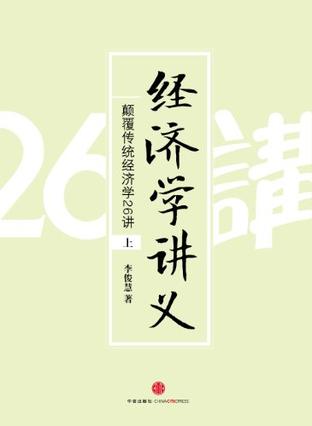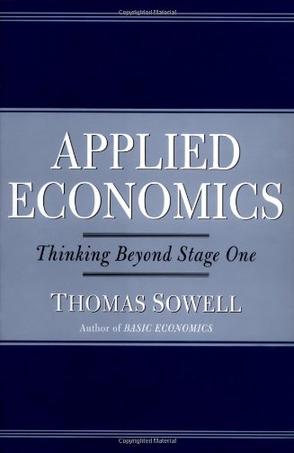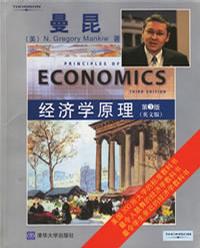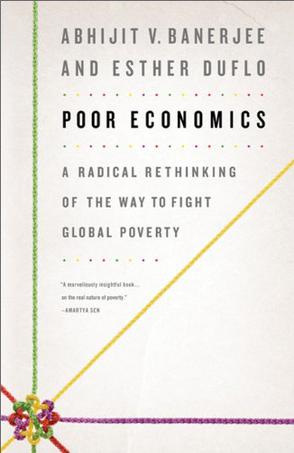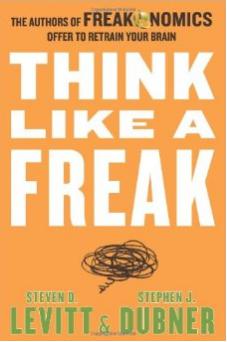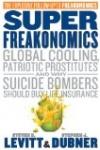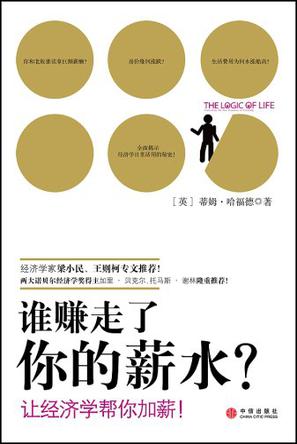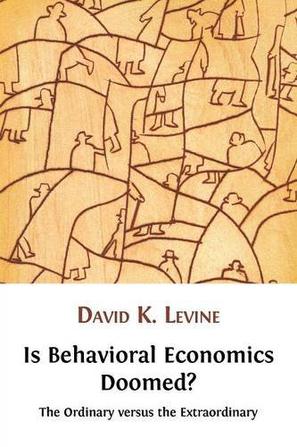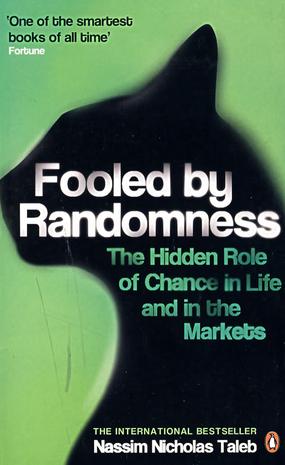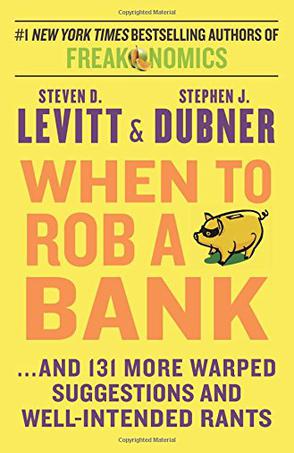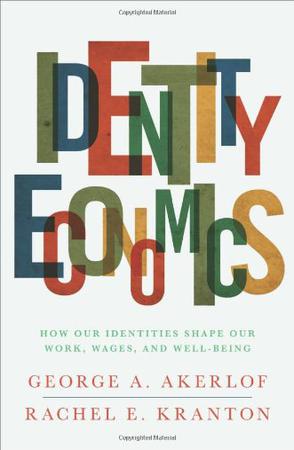欢迎来到相识电子书!
标签:economics
-
资本论
《资本论》全称(资本论·政治经济学批判》。是西方哲学大体系缔造者中的最后一人——卡尔·马克思经济学说中最主要的著作,同时也是马克思主义的重要的百科全书,更是研究资本主义社会经济形态的巅峰之作。 《资本论》创建了一个崭新的思想体系。其研究世界的方法源于德国哲学、早期社会主义理论和政治经济学。马克思像黑格尔一样;相信能够用一个辩证法公式概括人类的进化历程。他认为,所有哲学家所做的一切都在致力于解释世界,但他同时认为,问题的关键在于如何改变世界。他在黑格尔辩证法的基础之上,颠覆了传统的“形而上学”,建立了一个现实中得以实践的最大的思想体系,一个影响到地球50%以上人口的体系。 ... -
Free
The New York Times bestselling author heralds the future of business in Free . In his revolutionary bestseller, The Long Tail , Chris Anderson demonstrated how the online marketplace creates niche markets, allowing products and consumers to connect in a way that has never been possible before. Now, in Free , he makes the compelling case that in many instances businesses can profit more from giving things away than they can by charging for them. Far more than a promotional gimmick, Free is a business strategy that may well be essential to a company's survival. The costs associated with the growing online economy are trending toward zero at an incredible rate. Never in the course of human history have the primary inputs to an industrial economy fallen in price so fast and for so long. Just think that in 1961, a single transistor cost $10; now Intel's latest chip has two billion transistors and sells for $300 (or 0.000015 cents per transistor--effectively too cheap to price). The traditional economics of scarcity just don't apply to bandwidth, processing power, and hard-drive storage. Yet this is just one engine behind the new Free, a reality that goes beyond a marketing gimmick or a cross-subsidy. Anderson also points to the growth of the reputation economy; explains different models for unleashing the power of Free; and shows how to compete when your competitors are giving away what you're trying to sell. In Free , Chris Anderson explores this radical idea for the new global economy and demonstrates how this revolutionary price can be harnessed for the benefit of consumers and businesses alike. -
经济学
本书是当代经济学泰斗、1970年诺贝尔经济学奖得主萨缪尔森的不朽经济学著作,自1948年问世以来就广受赞誉,先后被翻译成40多种文字出版,是有史以来发行量最大、至今在全球范围内仍然被广泛采用的经济学教科书。第18版为2005年修订的最新版,在经历了前17版的积累和沉淀之后,无论在内容还是在形式上都已经近乎完美,而且在融入了时代变革的元素和新的案例和数据之后,《经济学》(第18版)可谓是更上一层楼。 全书共7编34章:包括基本概念,供给、需求和产品市场,要素市场,应用国际贸易、政府和环境,经济增长与商业周期,经济发展、经济增长与全球经济以及失业、通货膨胀与经济政策等内容。囊括了微观经济学和宏观经济学领域的大部分知识。在保持“把注意力始终放在经济学的基本概念和核心理论”这一风格的前提下,本书对金融经济学、网络经济学、环境经济学,以及全球化背景下的国际经济与贸易做了重点论述或重写,对前沿的实践及理论成果,对国际化外包、股息税改革、品牌价值以及行为经济学等也给出了最新的介绍。 本书适合于高等院校经济学专业、财经类专业本科生及教师,MPA、MBA、MBA、EMBA学员及教师,理论研究者,政府工作人员,企事业管理者及一般读者学习和研究之用。 -
The Undercover Economist
An economist's version of The Way Things Work, this engaging volume is part field guide to economics and part expose of the economic principles lurking behind daily events, explaining everything from traffic jams to high coffee prices. The Undercover Economist is for anyone who's wondered why the gap between rich and poor nations is so great, or why they can't seem to find a decent second-hand car, or how to outwit Starbucks. This book offers the hidden story behind these and other questions, as economist Tim Harford ranges from Africa, Asia, Europe, and of course the United States to reveal how supermarkets, airlines, and coffee chains--to name just a few--are vacuuming money from our wallets. Harford punctures the myths surrounding some of today's biggest controversies, including the high cost of health-care; he reveals why certain environmental laws can put a smile on a landlord's face; and he explains why some industries can have high profits for innocent reasons, while in other industries something sinister is going on. Covering an array of economic concepts including scarce resources, market power, efficiency, price gouging, market failure, inside information, and game theory, Harford sheds light on how these forces shape our day-to-day lives, often without our knowing it. Showing us the world through the eyes of an economist, Tim Harford reveals that everyday events are intricate games of negotiations, contests of strength, and battles of wits. Written with a light touch and sly wit, The Undercover Economist turns "the dismal science" into a true delight. -
Irrational Exuberance
This first edition of this book was a broad study, drawing on a wide range of published research and historical evidence, of the enormous stock market boom that started around 1982 and picked up incredible speed after 1995. Although it took as its specific starting point this ongoing boom, it placed it in the context of stock market booms generally, and it also made concrete suggestions regarding policy changes that should be initiated in response to this and other such booms. The book argued that the boom represents a speculative bubble, not grounded in sensible economic fundamentals. Part one of the book considered structural factors behind the boom. A list of twelve precipitating factors that appear to be its ultimate causes was given. Amplification mechanisms, naturally-occurring Ponzi processes, that enlarge the effects of these precipitating factors, were described. Part Two discussed cultural factors, the effects of the news media, and of "new era" economic thinking. Part Three discussed psychological factors, psychological anchors for the market and herd behavior. Part Four discussed attempts to rationalize exuberance: efficient markets theory and theories that investors are learning. Part Five presented policy options and actions that should be taken. The second edition, 2005, added an analysis of the real estate bubble as similar to the stock market bubble that preceded it, and warned that "Significant further rises in these markets could lead, eventually, to even more significant declines. The bad outcome could be that eventual declines would result in a substantial increase in the rate of personal bankruptcies, which could lead to a secondary string of bankruptcies of financial institutions as well. Another long-run consequence could be a decline in consumer and business confidence, and another, possibly worldwide, recession." Thus, the second edition of this book was among the first to warn of the global financial crisis that began with the subprime mortgage debacle in 2007 点击链接进入中文版: 非理性繁荣(第2版) -
经济学大师的人生哲学
本书展现了20世纪22位经济学大师的人生哲学和治学态度,其中包括九位诺贝尔经济学纪念奖获得者。 本书提供了一个难得的机会,使读者能够与波罗、萨缪尔森、丁伯根等大师进行面对面的交流,了解到经济学和经济学家在理论原理和计量经济学模型之外还有许多东西。……无论哪个年龄段的经济学家都应该读这本书。对于刚开始经济学生涯的那些人,本书更是必读之作。 -
新编博弈论平话
经济学正经历着一场博弈论革命,人们表现出了解博弈论的热情。这是因为现代经济活动早已超出传统经济学讨论的模式。 本书从囚徒困境、价格大战、慕尼黑谈判、诺曼底战役、所罗门王断案入手,初步介绍博弈的描述,寻求纳什均衡的方法,并且展示双赢对局、先动优势、后动优势、承诺和威胁及其可信性等概念,以及信息在博弈中的作用。 博弈论研究还表明,人们的社会行为和市场行为,常常不能够归结为彻底的“理性行为”,由此兴起的实验经济学在本书中也有反映。 -
郎咸平说:让人头疼的热点
本书内容主要选取最近国内发展中的经济热点,以及微观经济(公司治理)方面的热点话题,作者在总结国内外经验的同时,也提出了自己擅长的经济层面的解决方案。 -
经济学讲义(上)
《经济学讲义:颠覆传统经济学26讲(上)》根据作者向本科经济学专业学生讲授的经济学内容整理而成,原汁原味,活泼生动,用通俗易懂的语言和案例,结合张五常教授的《经济解释》三卷本,对经济学的基本概念进行了系统阐述,并对当前经济学界对这些概念的误读一一加以批判修整,“彪悍蛮横”,有理有据!不论是想走进经济学殿堂的零基础学生,还是想重温经济学奥妙的大众读者,《经济学讲义:颠覆传统经济学26讲(上)》都让人受益匪浅。 “经济学这门学科还太年轻了!目前所有的经济学教科书都充满了错误!”“经济学的教学发生了什么事?老师教得困难,学生学得沉闷,那绝非经济学。请让它回复其作为一门有趣的学问的本来面目吧!”“既然随大流的经济学教科书已经有那么多了,所以我决心要写一本不随大流,而是只讲授我认为是正确的东西的经济学教科书。” -
经济学原理
本书主要从供给与需求、企业行为与消费者选择理论、长期经济增长与短期经济波动以及宏观经济政策等角度深入浅出地剖析讲述了经济学的基本原理。本书以最浅显易懂的方式阐释了经济学最基本的思想,强调经济学原理的应用和政策分析。书中还提供了大量案例,以说明经济学原理在现实经济生活中的应用。本书适用于经济管理类本科生、研究生及MBA学生,也可作为经营管理人员的经济学指导书。... -
Poor Economics
Billions of government dollars, and thousands of charitable organizations and NGOs, are dedicated to helping the world's poor. But much of their work is based on assumptions that are untested generalizations at best, harmful misperceptions at worst. Abhijit Banerjee and Esther Duflo have pioneered the use of randomized control trials in development economics. Work based on these principles, supervised by the Poverty Action Lab, is being carried out in dozens of countries. Drawing on this and their 15 years of research from Chile to India, Kenya to Indonesia, they have identified wholly new aspects of the behavior of poor people, their needs, and the way that aid or financial investment can affect their lives. Their work defies certain presumptions: that microfinance is a cure-all, that schooling equals learning, that poverty at the level of 99 cents a day is just a more extreme version of the experience any of us have when our income falls uncomfortably low. This important book illuminates how the poor live, and offers all of us an opportunity to think of a world beyond poverty. -
Poor Economics
Billions of government dollars, and thousands of charitable organizations and NGOs, are dedicated to helping the world's poor. But much of their work is based on assumptions that are untested generalizations at best, harmful misperceptions at worst. Abhijit Banerjee and Esther Duflo have pioneered the use of randomized control trials in development economics. Work based on these principles, supervised by the Poverty Action Lab, is being carried out in dozens of countries. Drawing on this and their 15 years of research from Chile to India, Kenya to Indonesia, they have identified wholly new aspects of the behavior of poor people, their needs, and the way that aid or financial investment can affect their lives. Their work defies certain presumptions: that microfinance is a cure-all, that schooling equals learning, that poverty at the level of 99 cents a day is just a more extreme version of the experience any of us have when our income falls uncomfortably low. This important book illuminates how the poor live, and offers all of us an opportunity to think of a world beyond poverty. -
Think Like a Freak
Now, with Think Like a Freak, Steven D. Levitt and Stephen J. Dubner have written their most revolutionary book yet. With their trademark blend of captivating storytelling and unconventional analysis, they take us inside their thought process and teach us all to think a bit more productively, more creatively, more rationally—to think, that is, like a Freak. Levitt and Dubner offer a blueprint for an entirely new way to solve problems, whether your interest lies in minor lifehacks or major global reforms. As always, no topic is off-limits. They range from business to philanthropy to sports to politics, all with the goal of retraining your brain. Along the way, you’ll learn the secrets of a Japanese hot-dog-eating champion, the reason an Australian doctor swallowed a batch of dangerous bacteria, and why Nigerian e-mail scammers make a point of saying they’re from Nigeria. Some of the steps toward thinking like a Freak: First, put away your moral compass—because it’s hard to see a problem clearly if you’ve already decided what to do about it. Learn to say “I don’t know”—for until you can admit what you don’t yet know, it’s virtually impossible to learn what you need to. Think like a child—because you’ll come up with better ideas and ask better questions. Take a master class in incentives—because for better or worse, incentives rule our world. Learn to persuade people who don’t want to be persuaded—because being right is rarely enough to carry the day. Learn to appreciate the upside of quitting—because you can’t solve tomorrow’s problem if you aren’t willing to abandon today’s dud. #该内容由淘宝网-乐读书屋提供#http://l-books.taobao.com/ -
Super Freakonomics
The New York Times best-selling Freakonomics was a worldwide sensation, selling over four million copies in thirty-five languages and changing the way we look at the world. Now, Steven D. Levitt and Stephen J. Dubner return with SuperFreakonomics, and fans and newcomers alike will find that the freakquel is even bolder, funnier, and more surprising than the first. Four years in the making, SuperFreakonomics asks not only the tough questions, but the unexpected ones: What's more dangerous, driving drunk or walking drunk? Why is chemotherapy prescribed so often if it's so ineffective? Can a sex change boost your salary? SuperFreakonomics challenges the way we think all over again, exploring the hidden side of everything with such questions as: How is a street prostitute like a department-store Santa? Why are doctors so bad at washing their hands? How much good do car seats do? What's the best way to catch a terrorist? Did TV cause a rise in crime? What do hurricanes, heart attacks, and highway deaths have in common? Are people hard-wired for altruism or selfishness? Can eating kangaroo save the planet? Which adds more value: a pimp or a Realtor? Levitt and Dubner mix smart thinking and great storytelling like no one else, whether investigating a solution to global warming or explaining why the price of oral sex has fallen so drastically. By examining how people respond to incentives, they show the world for what it really is – good, bad, ugly, and, in the final analysis, super freaky. Freakonomics has been imitated many times over – but only now, with SuperFreakonomics, has it met its match. -
谁赚走了你的薪水
《谁赚走了你的薪水》(The Logic of Life)老板是笨蛋,无所事事却拿高薪,经济学家帮你看透薪水的秘密!曼哈顿的待嫁女总比光棍男多,可是她们却不肯去男人成堆的阿拉斯加,这里有什么奇怪的逻辑?房价缘何上涨?生活费用为何水涨船高?你和老板谁该拿巨额薪酬?经济学家帮你跑赢CPI! 世界是个不公平的地方,对吗?世界是个不讲道理的地方,对吗?老板收入高得那么离谱,他付出的辛苦那么少,而你象耕牛一样辛勤地工作却只得一点点的报酬,这有道理可讲吗?为什么你的爱情那么不圆满,打牌老输钱?为什么你只能望着房价飚升叹为观止?望着物价上涨望洋兴叹?这个世界,30秒的广告播了25秒还不知道卖的是什么、大城市的女人嫁出去越来越难、雇主招聘总戴有色眼镜、离婚还存在最佳比率……一切看起来太混乱! 《谁赚走了你的薪水》偏偏告诉你:所有现象背后都有合理的逻辑。如果你愤怒,那就让怒火燃烧吧,哈福德热爱这愤怒。他从未说过世界是公平的,这个世界仅仅是符合逻辑的。或许只有在阴谋家和象哈福德这样的经济学家眼中,世界才是讲得通的! 这是一本全新的经济学,不仅有趣而且十分刺激。 不信你就看看。 -
Fooled by Randomness
《财富》评选的75本商务人士必读书之一。股市的大起大落只发生在须臾之间,借鉴塔勒布的操作手法(这也是不少操盘手正在做的),您将能避免风险,并在黑天鹅出现时大赚一笔。说股票交易者应该人手一册本书绝对不过分。 人的本性经常低估随机现象,我们很需要这样的书。妙趣横生、清新隽永且独具一格,令人玩味无穷。——罗伯特·希勒(畅销书《非理性繁荣》作者) 本书常识性知识俯拾即是。如果你是交易员、科学家,或者哈佛律师,本书必读。——保罗·威尔莫特(《衍生性金融商品》作者) 简单一句话:这本书让人看得入迷。埋首其中,你对生命(以及你的钱财)的了解将大为增进,这可不是随机性的结果。——伯恩斯坦(彼得·伯恩斯坦公司总裁) 当还是股市中的一位菜鸟级别的交易员时,作者塔勒布曾成功地在一次股灾中得以幸免,他潜心半年研究这场风暴,认为他的逃脱不是有比其他人高明之处,完全是运气好——运气在金融市场中起着重要的作用,但是人们却总是过低地估计了随机作用,忍不住想对事物做出自己的解释,这就形成了种种迷信。由此他写作了这样一部关于运气——随机性的书。 塔勒布指出:在基因上,我们仍和未开化的土著人很接近。我们的信念的形成,充满着迷信──即使现今也不例外(或许必须说,尤以今天为甚)。某一天,原始部落的某个人抓了鼻子之后不久,雨开始下了,于是他煞费苦心发展出一套抓鼻子祈雨的方法。同样的,我们会把经济的繁荣归功于联邦储备委员会降低利率;或者一家公司经营成功,竟和新总裁“走马上任”有关。类似风马牛不相及的事件屡屡被我们扯上联系,并导致我们在人生的重要抉择关头步步踏错,先机尽失。 生活中随机性无处不在,即使是专业的数学家,并精于概率的计算,也往往会被随机性所捉弄,塔勒布最后建言:我们虽然无法避免随机性,但我们可以学着接受它。塔勒布的理念已经自成一派,世界上相当多的股票交易员都承认受到他理念的影响——从稀有事件中获取收益。这绝对是每一位证券交易者都应该珍藏的一本书! Everyone wants to succeed in life. But what causes some of us to be more successful than others? Is it really down to skill and strategy – or something altogether more unpredictable? This book is the word-of-mouth sensation that will change the way you think about business and the world. It is all about luck: more precisely, how we perceive luck in our personal and professional experiences. Nowhere is this more obvious than in the markets; we hear an entrepreneur has ‘vision; or a trader is talented;, but all too often their performance is down to chance rather than skill. It is only because we fail to understand probability that we continue to believe events are non-random, finding reasons where none exist. This irreverent bestseller has shattered the illusions of people around the world by teaching them how to recognize randomness. Now it can do the same for you. -
Identity Economics
"Identity Economics" provides an important and compelling new way to understand human behavior, revealing how our identities - and not just economic incentives - influence our decisions. In 1995, economist Rachel Kranton wrote future Nobel Prize-winner George Akerlof a letter insisting that his most recent paper was wrong. Identity, she argued, was the missing element that would help to explain why people - facing the same economic circumstances - would make different choices. This was the beginning of a fourteen-year collaboration - and of "Identity Economics". The authors explain how our conception of who we are and who we want to be may shape our economic lives more than any other factor, affecting how hard we work, and how we learn, spend, and save. Identity economics is a new way to understand people's decisions - at work, at school, and at home. With it, we can better appreciate why incentives like stock options work or don't; why some schools succeed and others don't; why some cities and towns don't invest in their futures - and much, much more. "Identity Economics" bridges a critical gap in the social sciences. It brings identity and norms to economics. People's notions of what is proper, and what is forbidden, and for whom, are fundamental to how hard they work, and how they learn, spend, and save. Thus people's identity - their conception of who they are, and of who they choose to be - may be the most important factor affecting their economic lives. And the limits placed by society on people's identity can also be crucial determinants of their economic well-being.
热门标签
下载排行榜
- 1 梦的解析:最佳译本
- 2 李鸿章全传
- 3 淡定的智慧
- 4 心理操控术
- 5 哈佛口才课
- 6 俗世奇人
- 7 日瓦戈医生
- 8 笑死你的逻辑学
- 9 历史老师没教过的历史
- 10 1分钟和陌生人成为朋友

